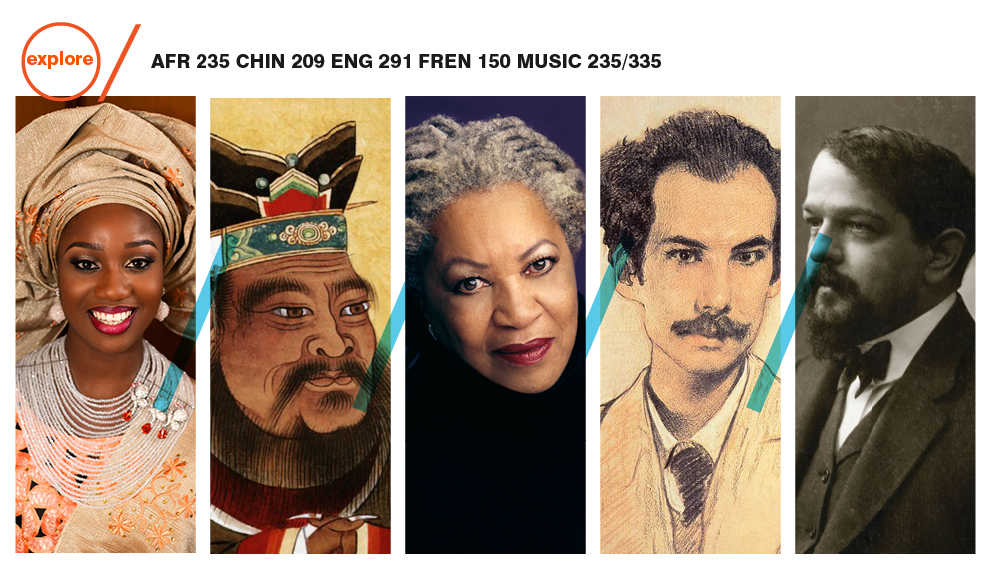Explore Racial Differences, French Music, Chinese Ideas, African Societies, The World, and More This Semester

Thomas Hodge, professor of Russian, recently offered students some sound advice about approaching their academic career at Wellesley. “Explore! These four years are your years," he said. "You have a little less than half a decade to figure out what lights your fire as a young intellectual...”
As the first week of the semester draws to a close, students still have a little time to shape their fall schedule. Wellesley offers more than a thousand courses and 52 majors, including many interdepartmental majors. Here's a snapshot of five fall Humanities courses. Students are invited to explore these offerings, and the myriad others, designed to take them on an intellectual journey to different places in the world, and to different time periods, through literature, music, culture, and the study of lived experience, modern ideas and classical thinking, and more.
Explore Racial Differences.
In ENG 291 What is Racial Difference? with Cord Whitaker, assistant professor of English, students examine the nature of race using “classical, medieval, early modern, and modern materials” and investigate the ways thinkers have categorized groups of people through the ages. In a video, Whitaker said he developed the class “in response...to modern, political, economical and cultural dynamics, such as the Black Lives Matter movement, and what [they have] revealed about the everyday experiences of large numbers of Americans [as well as the] long historical trajectory that informs them.” The course, which is supported by a grant from the National Endowment for the Humanities, examines the development of race through discussions of linguistic, physical, geographic, and religious differences through the ages; “from the Tower of Babel to Aristotle, from the Crusades to nineteenth-century racial taxonomies, [and] from Chaucer to Toni Morrison.”
Explore Chinese Ideas.
Through CHIN 209 Chinese Ideas, Ideas of China, with Sarah Allen, associate professor of Chinese, students explore China’s land and culture, and study the “twin influences of China’s own past and the global present” and the diversity of Chinese ideas, from antiquity to the present. Students will also consider what it means to study a civilization or culture, and look both at how China and the Chinese have been perceived by foreigners and how Chinese writers have presented China and its peoples to foreigners. No previous knowledge of China or the Chinese language is required; the course is conducted in English.
Explore The World in 1913.
FREN 150 1913: A Year in the Life of the World with Jim Petterson, professor of French, uses three novels to explore, in depth, the year 1913. That was the year when the arts, sciences, and politics of the time “entwined to produce a new landscape in which the vision of Europe as the radiant center of the twentieth-century global structure begins to be profoundly altered.” Through Marcel Proust’s Swann’s Way, Thomas Mann’s Death in Venice, and Andrei Bely’s Petersburg, students will examine the artistic paths and venues that arose in 1913, along with the canals (of Panama and Venice), the channels (of the Freudian subconscious), and the trenches and ditches (of the Balkan Wars and the impending World War I) that begin to redraw the bewildering aesthetic, geographical, mental, and sociopolitical landscape. This course is conducted in English.
Explore French Music.
MUSIC 235/335 Finding France in French Piano Music with Gurminder Bhogal, associate professor of Music, explores French piano music composed by Gabriel Fauré, Maurice Ravel, and Claude Debussy at the end of the 19th and beginning of the 20th centuries. Students will discuss what makes this repertoire “French,” and the musical techniques that set this repertoire apart from other schools of pianism in Europe. A central goal is to reflect on the ways in which compositional innovation responded to—and in turn guided—avant-garde figures working in the visual arts, poetry, and literature. Students analyze music by these composers while reading widely across the fields of music, art, literature, and culture.
Explore the Societies and Cultures of Africa.
AFR 235 Societies and Cultures of Africa with Filomina Steady, professor of Africana Studies, provides students with “an introduction to the richness, diversity, and complexity of African societies and cultures.” The class will explore forms of social organization; the importance of kinship and marriage systems; the centrality of religion; the position of women; urbanization and problems of development, democratization, and political transformation; political instability; and armed conflicts. The course will involve an in-depth case study of one ethnic group: the Yoruba of southwestern Nigeria.
Students, what will you explore this fall?
